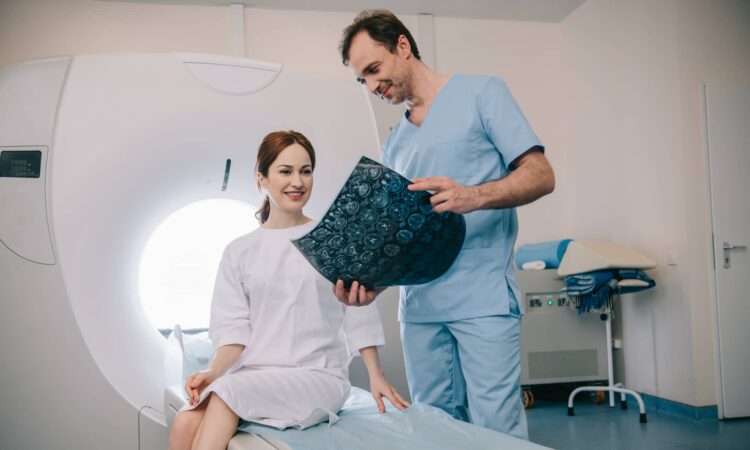The 5-Minute Heart Test

It not only measures your risk of having a heart attack – which it’s designed for – it’s closely associated with your risk of “all-cause mortality.”
That is, of dying from anything, including cancer. Due to its nature, it’s particularly suited for detecting risk for atherosclerotic cardiovascular diseases (ASCVD).
And it’s quick, easy, and simple. It’s non-invasive and takes just five minutes.
It’s a Coronary Artery Calcium scan or heart scan – often shortened to just CAC.
The American College of Cardiology/American Heart Association guidelines say: “measuring CAC is likely to be the most useful of the current approaches to improving risk assessment among individuals found to be at intermediate risk after formal risk assessment.”
What is CAC
It’s basically a CT scan of the major arteries leading to your heart. A heart attack occurs when plaque in one of those arteries breaks off, and then blocks the artery, depriving your heart of required blood.
This plaque consists of cholesterol, fat, and calcium.
It’s a chronic inflammatory condition. Your immune system responds to the inflammation in the endothelial lining of these arteries, and it tries to heal the problem. That causes a fatty streak.
This causes the depositing of white blood cells, red blood cells, macrophages and lipid-rich LDL cholesterol. This causes the formation of a lipid core, which calcifies.
Of course, calcified plaque doesn’t just appear there in the coronary arteries overnight – it builds up slowly and gradually over the years. It can progressively grow large enough to tighten the arteries, blocking the free flow of blood.
The CAC test measures this calcification.
An Easy Peasy Test
The scanner itself, like any CT machine, is a large doughnut shape, but far smaller than others.
The medical techs attach electrodes to your chest. Then you lie on a small cot with your arms back over your head. You’re pushed in so your chest is under the open “doughnut.”
You are never in an enclosed space.
Repeat several times, then it’s over.
The process measures the buildup of calcium in each artery, and you’re given an overall score.
It’s a marker of atherosclerosis and is a good measure of future heart attack risk.
If your score is really high, you could be referred for immediate treatment.
CAC Scores:
0: Congratulations! However, don’t be complacent. We all have some calcification. Even ten-year-olds have fatty streaks in their arteries. A 0 score is great, but actually isn’t literally “0” – it just means you have so little plaque it’s beyond detection by the test.
1 – 10: A small amount of plaque
11 – 100: Some more plaque
101 – 400: You have a moderate to high risk of heart attack. Don’t ignore it.
Over 400: Your risk of a heart attack, stroke or other ASCVD event is high.
Evaluating Your Score
Talk to your doctor. They will also look at other measures, especially your cholesterol. That by itself is a major risk factor to combine with your CAC. Remember: if you have atherosclerosis, it’s built up for decades.
If both are high, your doctor will want to take some action.
Maybe prescribe statin drugs to lower cholesterol – maybe something more serious, such as bypass surgery or coronary stenting.
Is CAC Risky?
You are exposed to about 1 mSv of radiation, more if your BMI is above 30. 1 mSv is about what you get from background radiation in one year.
Why Doesn’t Everybody Take a CAC Test?
It may not be covered by medical insurance, meaning you may have to pay for it out of your pocket. In my area, it runs under $200. (It could cost more or less in your area.) To me, that’s an incredible value if you’re at risk.
Talk it over with your doctor, who has to balance your risk factors such as age and cholesterol levels.
Don’t wait for symptoms. Only 50% of first-time heart attack victims survive it. 50% of those heart attack survivors say they had no symptoms before the attack.
Taking a CAC does NOT require a prescription or referral from your doctor – but let them know the results.
If your score is higher than 0, you should want to know that now, so you can take action to lower it.
If you don’t change your lifestyle, your score will go higher with age.
Warning
Some medical professionals believe knowing your CAC score is not worth the risk of radiation exposure.
That’s why you should first talk about it with your doctor.
Nonmedical Ways to Reverse Coronary Plaque and Calcification
You absolutely must adjust your lifestyle:
1. If you smoke, quit.
This is so obvious, it’s almost ridiculous to have to say it – but 10% of Americans still smoke.
2. Eat more whole plant foods.
Whole grains, vegetables, fruits, beans, nuts and seeds.
3. If you drink alcohol, stop.
Or at least lower the volume you consume.
4. Stop eating refined grains and sugars.
5. If you’re overweight, lose the excess weight.
6. Cut way down on how much salt you consume.
7. Get regular, moderate exercise.
Pay great attention to what your body tells you. Fatigue is good. Chest pains during exercise are not.
8. Greatly reduce how much calcium in dairy you consume.
Yes, calcium is good and necessary. Get it from leafy green vegetables, not milk, cheese or ice cream.
My Suggestion
If you’re over 50, talk with your doctor regarding all your risk factors and your current lifestyle.
Whether you get a CAC scan or not, pretend the score is sky-high – and MAKE THE HEALTHY LIFESTYLE CHANGES.
Without a good diet and regular healthy exercise, your CAC score will be high . . . sooner or later.
That’s why heart disease is still the Number One cause of death in the United States, as it has been for decades.
Despite all medical advances, it still kills over 600,000 of us every year.
Act now, to prevent you from becoming a heart attack statistic.
https://www.aafp.org/pubs/afp/issues/2019/1215/p734.html
https://www.princetonradiology.com/service/screenings/cardiac-calcium-scoring/
https://www.houstonmethodist.org/blog/articles/2021/oct/calcium-score-what-is-a-cac-test-do-i-need-one/
https://www.ajronline.org/doi/10.2214/AJR.10.5577
https://journals.plos.org/plosone/article?id=10.1371/journal.pone.0276659
https://www.youtube.com/watch?v=HpQJk-h3IwY
https://www.youtube.com/watch?v=ckvRgUDILPQ&t=861s
https://nutritionfacts.org/video/how-to-reverse-heart-failure-with-diet/
Williams KA. Introduction to the “A plant-based diet and cardiovascular disease” special issue. J Geriatr Cardiol. 2017;14(5):316.
Massera D, Graf L, Barba S, Ostfeld R. Angina rapidly improved with a plant-based diet and returned after resuming a Western diet. J Geriatr Cardiol. 2016;13(4):364-6.
Massera D, Zaman T, Farren GE, Ostfeld RJ. A Whole-Food Plant-Based Diet Reversed Angina without Medications or Procedures. Case Rep Cardiol. 2015;2015:978906.
Ornish D, Brown SE, Scherwitz LW, et al. Can lifestyle changes reverse coronary heart disease? The Lifestyle Heart Trial. Lancet. 1990;336(8708):129-33.
Choi EY, Allen K, Mcdonnough M, Massera D, Ostfeld RJ. A plant-based diet and heart failure: case report and literature review. J Geriatr Cardiol. 2017;14(5):375-378.
Allen KE, Gumber D, Ostfeld RJ. Heart Failure and a Plant-Based Diet. A Case-Report and Literature Review. Front Nutr. 2019;6:82.
https://meridian.allenpress.com/thij/article/49/2/e186793/478371/Radiation-Doses-in-Patients-Undergoing-Computed







